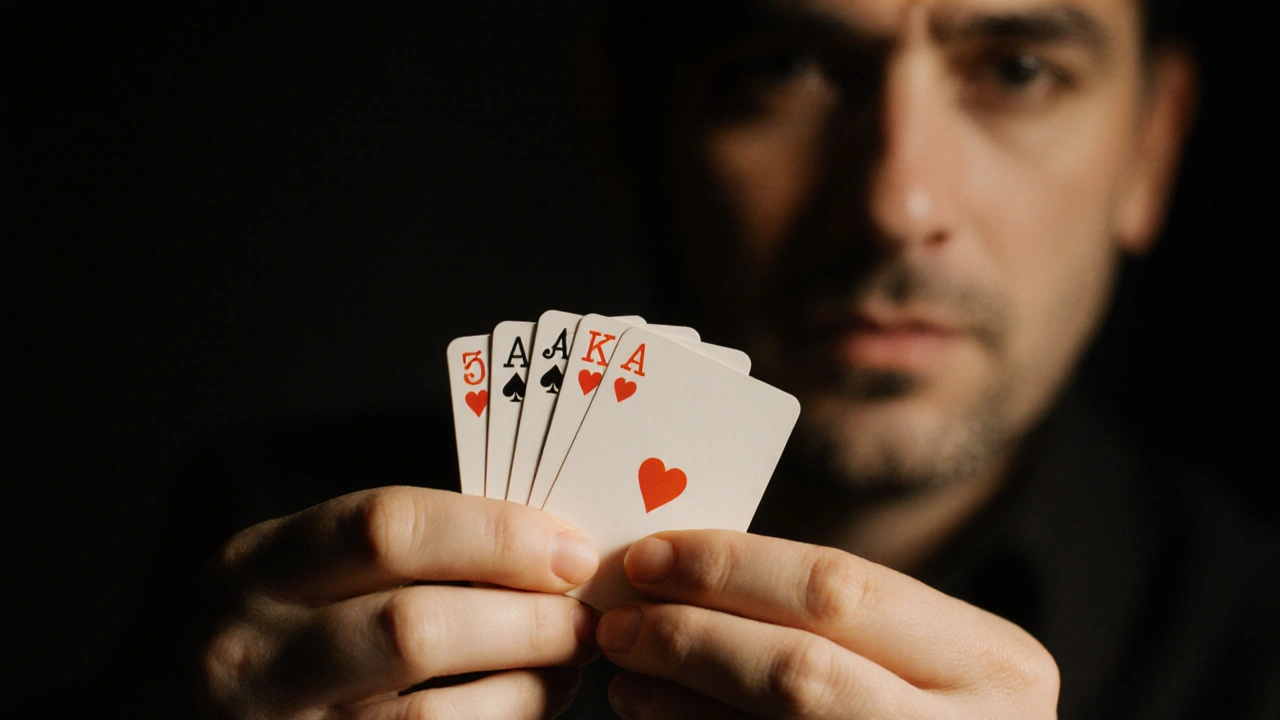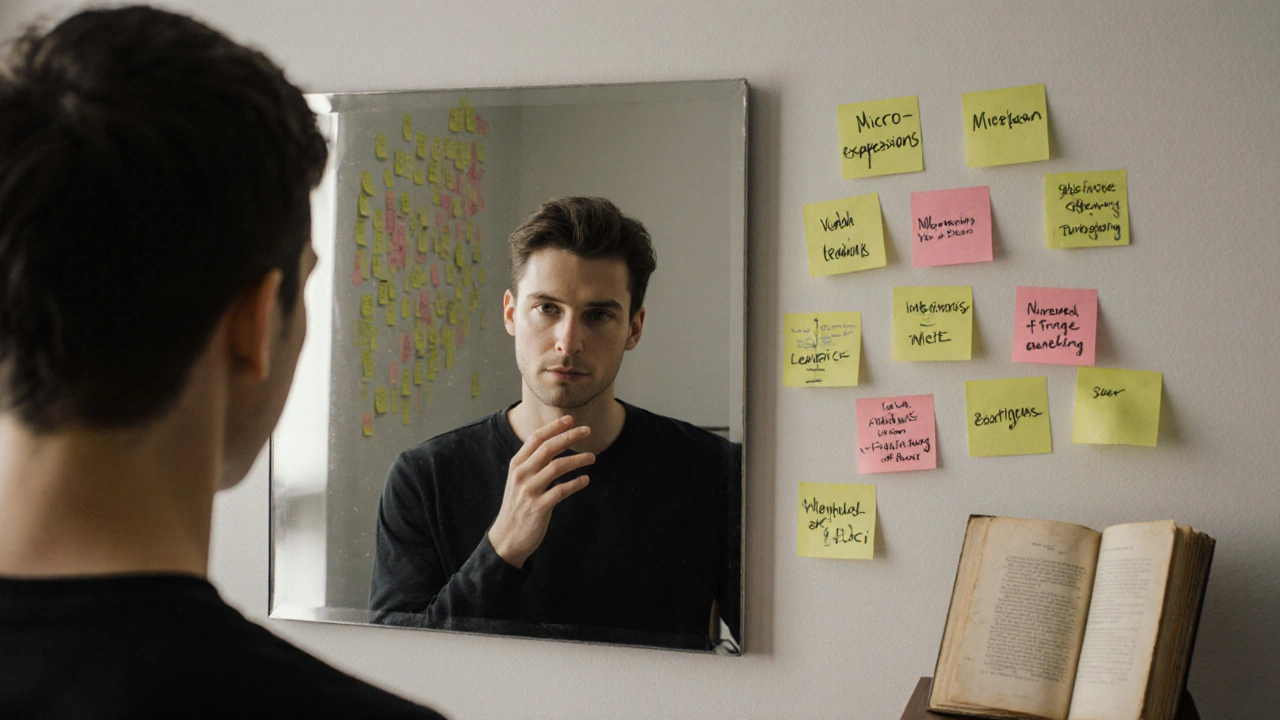People see mentalists on TV-guessing cards, reading thoughts, predicting names-and wonder: Can you train yourself to be a mentalist? The answer isn’t yes or no. It’s more like: Yes, but not the way you think. You won’t find a magic book that gives you supernatural powers. Real mentalism isn’t about ESP. It’s about observation, psychology, and practiced misdirection. And yes, you can learn it. But only if you’re willing to stop chasing magic and start studying people.
What Mentalism Actually Is (And What It Isn’t)
Mentalism isn’t magic with a lab coat. It’s not about bending spoons or making objects disappear. It’s about making people believe you’ve read their mind. The best mentalists don’t guess-they guide. They use cold reading, hot reading, body language cues, and subtle language patterns to create the illusion of mind reading. A mentalist doesn’t know your mother’s name. They notice you’re wearing a wedding ring, your voice cracks when you say "my wife," and they ask: "Did you lose someone close recently?" You say yes. They didn’t read your mind. They pieced together clues you gave away without realizing it.
Think of it like detective work, but instead of solving crimes, you’re solving people. The tools? Memory, timing, and understanding how the human brain fills in gaps. A 2023 study from the University of London found that 87% of participants in mentalism demonstrations believed the performer had supernatural ability-even when they were shown the exact techniques afterward. The mind wants to believe. Good mentalists just give it the right nudge.
The Core Skills You Need to Build
If you want to train yourself, you need to master four things:
- Cold reading-making educated guesses based on appearance, speech, and context. For example, someone wearing a university hoodie and carrying a textbook on cognitive psychology is more likely to be a student than a construction worker. You don’t need to know their name-you just need to ask the right question.
- Hot reading-gathering information ahead of time. This isn’t cheating. It’s preparation. A mentalist at a corporate event might research the company’s leadership team before the show. At a family gathering, they might casually ask a friend about recent events. Information is power.
- Micro-expression recognition-seeing the fleeting facial movements people can’t control. A slight lip twitch when you mention a name? A raised eyebrow when you say "ex-boyfriend"? These aren’t secrets. They’re signals. Books like Paul Ekman’s Facial Action Coding System break them down. You don’t need a PhD. Just practice watching people in coffee shops.
- Verbal pacing and leading-how you phrase questions to steer answers. Instead of asking, "Did you lose someone?" you say, "I’m sensing someone important in your life who’s no longer here. Was it a parent? A partner?" The person doesn’t say no. They say yes to one of the options. You didn’t guess. You gave them a script.
These aren’t tricks you learn overnight. They’re habits you build over months. Start small. Watch a friend’s face when you mention a movie they love. Notice how their eyes light up. Then try it with someone who hates that movie. The difference is subtle-but it’s there.
How to Start Training (Step-by-Step)
You don’t need expensive courses or mentors. You need consistency and curiosity.
- Observe one person a day. Pick someone in public-a barista, a bus rider, a coworker. Note their clothing, posture, phone usage, how they speak. Write down three things you think about them. Later, check if you were right. You’ll be surprised how often you’re close.
- Practice cold reading on friends. Tell someone: "I’m getting a strong sense you’ve changed something important in the last year." Watch their reaction. If they hesitate, ask: "Was it a job? A relationship? A move?" Most people will pick one. You didn’t read their mind. You gave them permission to reveal it.
- Learn basic memory techniques. Mentalists don’t memorize decks of cards by magic. They use the Method of Loci-associating cards with places in a familiar room. Start with memorizing 10 random words in order. Use your kitchen. The first word is on the fridge. The second is on the toaster. Repeat until you can do it blindfolded.
- Record yourself. Practice a short routine. Watch the video. Where did you pause too long? Where did you sound unsure? Mentalism lives in the silence between words. If you rush, the illusion breaks.
- Study real mentalists. Watch Derren Brown’s performances. Notice how he doesn’t say "I know what you’re thinking." He says, "I think you might be thinking of a number… maybe 7?" He gives space for the person to agree. That’s the art.

Common Mistakes Beginners Make
Most people fail because they try to be too dramatic too soon.
- Overdoing the theatrics-flashing lights, loud music, fake accents. Real mentalism thrives in quiet rooms. People pay attention when you’re calm.
- Asking yes/no questions-"Are you thinking of the number 3?" That’s a trap. People say no. Instead, say: "I’m sensing a number between 1 and 10. It’s not 1, not 2… maybe it’s 7?" You’ve already narrowed it down.
- Trying to read minds instead of guiding thoughts-Mentalism isn’t about knowing. It’s about creating the feeling of knowing. Your job isn’t to guess. It’s to make them feel like you did.
- Ignoring feedback-if someone says, "How did you know?" and you reply, "I just have a gift," you’ve lost. Say: "I noticed you smiled when I mentioned your dog. That’s when I knew." Now you’ve turned magic into logic-and that’s more powerful.
What You Can and Can’t Do
Let’s be clear: you won’t predict lottery numbers. You won’t know what your friend’s ex whispered on their wedding day. Mentalism works with probabilities, not certainties. It’s about creating the illusion of impossible knowledge using real human behavior.
What you can do:
- Guess a randomly chosen card from a deck-by using a force technique and reading micro-reactions.
- Name someone’s favorite song without them saying it-by noticing their playlist on their phone case or the lyrics they hum.
- Predict a word someone will write down-by using word association patterns (most people pick "red," "chair," or "dog" when asked to think of something random).
What you can’t do:
- Read thoughts from a stranger you’ve never met.
- Know the exact date of a private memory.
- Make someone believe something that contradicts their core beliefs.
Mentalism isn’t about control. It’s about connection. The moment you start seeing people as puzzles to solve, you’ve missed the point.

Why This Isn’t Just a Party Trick
Learning mentalism changes how you see the world. You start noticing how people lie without lying. How they avoid eye contact when they’re uncomfortable. How they use filler words like "um" and "you know" to buy time. These aren’t just tools for performance. They’re tools for life.
Managers use cold reading to sense team morale. Therapists use pacing to build trust. Salespeople use leading questions to guide decisions. Mentalism skills are just applied psychology. The difference? You’re doing it for fun-and people think you’re psychic.
One student in Bellingham started practicing cold reading on her coworkers. Three months later, she got promoted. Her boss said: "You always seem to know what people need before they say it." She didn’t have magic. She had practice.
Where to Go From Here
Start with Derren Brown’s YouTube videos. Watch them without sound. Just watch his hands, his pauses, his eye movements. Then watch with sound. Notice how he never says "I’m a mentalist." He says, "Let’s see what happens."
Buy a used copy of The Full Facts Book of Cold Reading by Ian Rowland. It’s not flashy. It’s dry. It’s the most honest book on the subject. It won’t teach you to read minds. It’ll teach you how to make people think you can.
Practice for 15 minutes a day. Not for a week. Not for a month. For a year. You won’t become a stage mentalist. But you’ll become someone people look at differently. Someone who notices things others miss. And that’s the real magic.
Can anyone learn mentalism, or do you need a special talent?
You don’t need a special talent. You need patience and attention. Mentalism is a skill, not a gift. People who seem naturally good at it have practiced observing others for years. Anyone who can notice when someone avoids eye contact or changes their tone can learn it. It’s like learning to ride a bike-some pick it up faster, but everyone can do it with practice.
Is mentalism the same as magic?
No. Magic hides physical actions-cards up sleeves, disappearing coins. Mentalism hides psychological ones-how you phrase questions, how you read reactions, how you make people believe they chose freely when they didn’t. A magician makes you think you saw something impossible. A mentalist makes you think you thought something private.
Do mentalists use technology or hidden devices?
Some do, especially in TV shows. But the best mentalists don’t need them. Real mentalism works with human behavior alone. If you’re learning to do it yourself, skip the gadgets. Focus on listening, watching, and timing. The most powerful tools are your eyes, ears, and memory.
How long does it take to get good at mentalism?
You can perform a simple routine in a few weeks-like guessing a card someone picks. But to be convincing, you need months of daily practice. Most serious practitioners spend at least a year before they feel comfortable performing for strangers. It’s not about speed. It’s about precision.
Can mentalism help with social anxiety?
Yes. Learning to read body language and respond to social cues builds confidence. When you understand why someone looks away or changes the subject, you stop taking it personally. You start seeing patterns instead of threats. Many people who learn mentalism say it made them better listeners, better friends, and less afraid of conversations.
Final Thought: The Real Trick
The greatest mentalist trick isn’t in the performance. It’s in the realization that you’ve been reading people your whole life. You just never called it mentalism. Now you have a name for it. And a way to get better.

